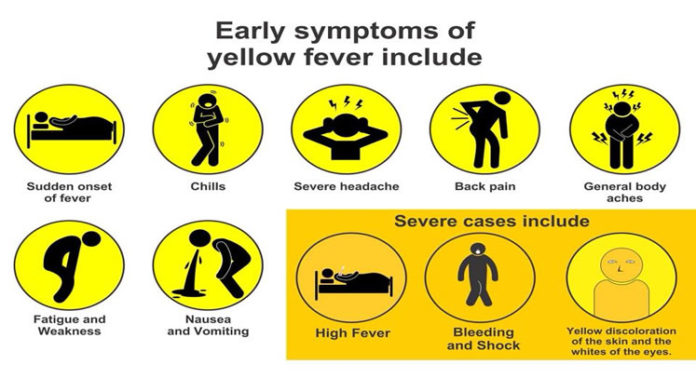Three rapid-response teams have been deployed to Katsina, Bauchi and Benue this week to support response to outbreak of Yellow fever.
There’s been an upsurge of cases of yellow fever between August 1 and November 5 this year.
Some 511 cases suspected to be yellow fever have come from the three states—309 from Katsina, 162 from Bauchi, and 40 from Benue.
Among the samples tested, 83 were confirmed positive—43 in Katsina, 34 in Bauchi and six in Benue.
At least 599 infections suspected to yellow fever have been reported in Katsina. Only 43 confirmed positive to the disease and 77 people have been killed, despite a mass vaccination in September.
The reported cases suspected to be yellow fever in Bauchi have mostly come from Alkaleri council area.
Bauchi recorded a total 183 infections suspected to be yellow fever: 34 confirmed positive and 24 people have died.
Following the outbreak in Alkaleri LGA, a reactive vaccination campaign was carried out.
Benue State has recorded 150 suspected cases, six confirmed cases and no death in 2019.
Vaccination campaigns have been carried out in three LGAs of the state this year- Vandekiya LGA in January 2019, Oju and Ado LGAs in September.
Both the Nigeria Centre for Disease Control (NCDC) and the National Primary Health Care Development Agency (NPHCDA) have been working with development partners to support the states to prevent and reduce the number of cases and deaths.
“In total, yellow fever vaccination campaigns have been implemented in 13 of the 36 states in Nigeria and in the FCT,” NCDC director-general Chikwe Ihekweazu said in a statement.
Yellow fever virus is spread through bite of an infected mosquito. There is no human-to-human transmission of the virus.
Yellow fever is a completely vaccine-preventable disease and a single shot of the yellow fever vaccine protects for a lifetime.
“In Nigeria, vaccination against yellow fever is primarily through the routine childhood immunisation,” said Ihekweazu.
“Where necessary, catch up campaigns are carried out to increase population immunity. The yellow fever vaccine is available for free in all primary healthcare centres in Nigeria as part of the routine childhood immunisation schedule. We encourage every family to ensure that children receive all their childhood vaccines.
“In addition to the vaccine, the public is advised to keep their environment clean and free of stagnant water to discourage the breeding of mosquitoes and ensure the consistent use of insecticide treated mosquito nets, screens on windows and doors to prevent access for mosquitoes. Especially, hikers, park visitors and people engaged with activities in the wild are encouraged to be vaccinated against yellow fever. It is important to avoid self-medication; visit a health facility immediately if you feel ill.
“Healthcare workers and members of the public are reminded that the symptoms of yellow fever include yellowness of the eyes, sudden fever, headache and body pain. If you have these symptoms or notice someone in your community displaying them, please contact your nearest primary healthcare centre.”
























